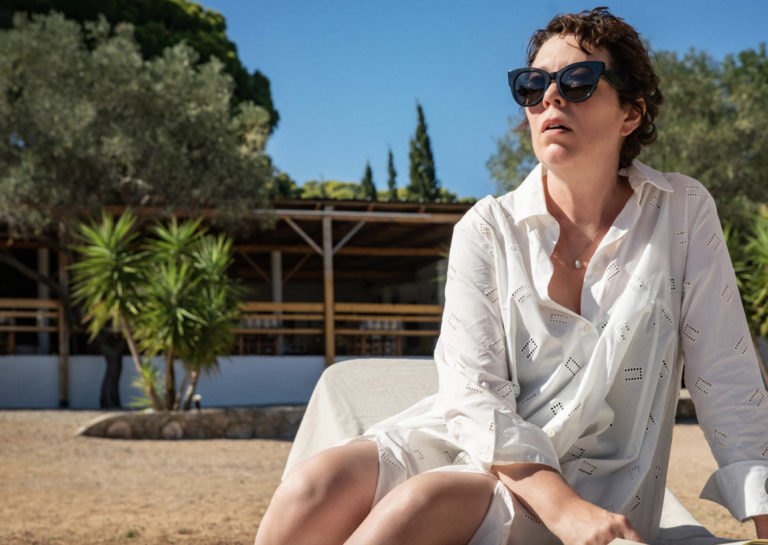
Synopsis : Alone on a seaside vacation, Leda becomes consumed with a young mother and daughter as she watches them on the beach. Unnerved by their compelling relationship, (and their raucous and menacing extended family), Leda is overwhelmed by her own memories of the terror, confusion and intensity of early motherhood. An impulsive act shocks Leda into the strange and ominous world of her own mind, where she is forced to face the unconventional choices she made as a young mother and their consequences.
Q&A with director Maggie Gyllenhaal, Actress Olivia Coleman, Actor Peter Sarsgaard, Actor Ed Harris, Actress Dakota Johnson, Actress Dagmara Dominczyk, Actor Paul Mescal
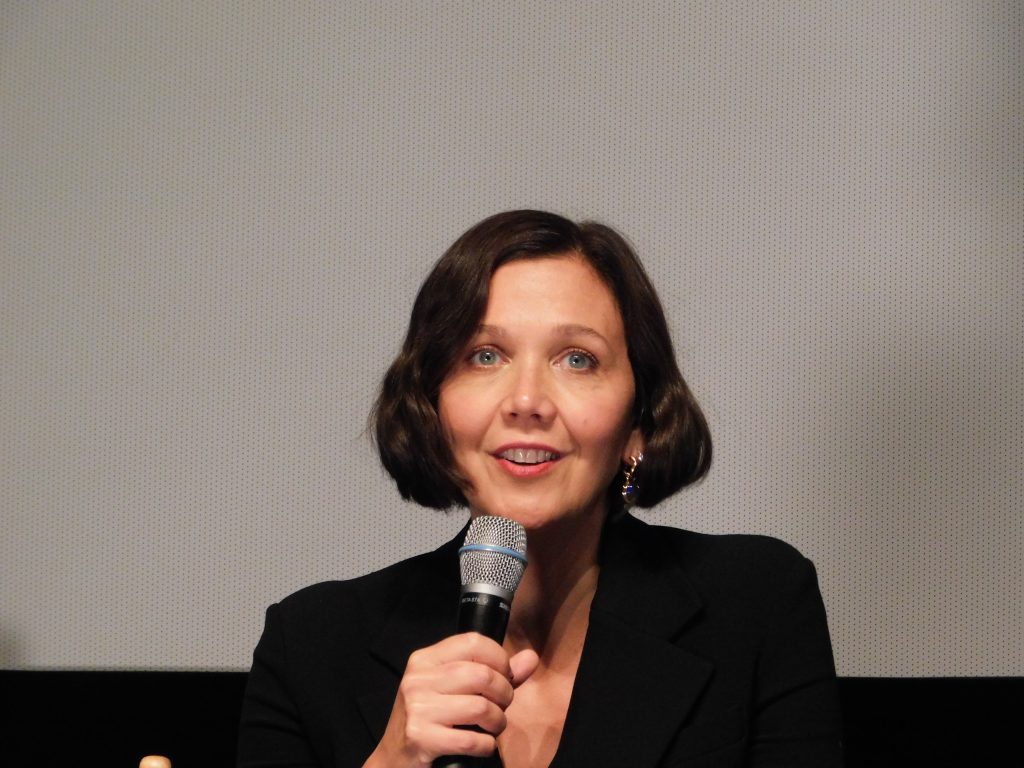
Q: Maggie, I’m going to start with you. This is your first film as a director, but it has the confidence of a veteran. It’s coming from a very profound, honest and urgent place, both stylistically and thematically, on what it means to walk in the shoes of the woman. I am wondering how you first became acquainted with this material, what was your entry point, and why you chose it to be your [directorial] debut.
MG: Well, I read Ferrante. I read the Neapolitan novels My Brilliant Friend and the one that followed it [The Story of a New Name], I think pretty much when they came out, and I loved them. I was totally shocked by the books.
I guess I feel like I have seen so many representations of women in music and books and movies that were compelling, but maybe they didn’t feel totally right to me. They felt like a kind of fantasy. I think I spent a lot of my time – maybe even I still do in some ways – trying to fit myself into this fantasy that I kept seeing described everywhere, and coming up short or feeling like too much.
Then with Ferrante, some of the things she was saying I had never heard said out loud before. I have this experience where I thought “oh my god this woman in this book is so fucked up.” Then less than ten seconds later, I would think “I really relate to her.” So am I so fucked up, or is this actually a common experience that nobody’s talking about? I thought having this experience alone in my room, so are people all over the world.
What if you gave people an opportunity to have that experience in a space like this, surrounded by other people? Strangers, or a mother or your husband or your daughter. That seems like a radical thing to do, so that’s why I wanted to try.
Q: Watching it was certainly a really validating experience, and I share all this feeling as well. So what was it like adapting the book, Ferrante being a writer who writes under a pseudonym? Maybe no one knows who she is. So how did you approach her and get the rights to the book and what was that process like? Did she allow you to own the material, or was she more involved?
MG: Yeah, I have so many things to say about this, I’ll try and be brief. I wrote to her to petition her for the rights to the book. I don’t know who she is. All my interactions with her have been through email. I [emailed] her a letter that it took weeks to write. I said I wanted to direct it and I wanted to adapt it and gave her a sense of why, and what I was thinking. And she said yes. But she said “this contract we’re making is void if you don’t direct it.” Which I took — because I don’t know who she is. It’s a kind of gift to not know who she is because she’s this fantasy wise, supportive woman out there in the cosmos. It’s such a supportive thing to do. Because I was afraid to take it on and direct it, and she was saying to me, “No, do it.”
Then I was writing. I was in this theater doing a Q&A about “The Kindergarten Teacher” when I got all these emails that Ferrante had written a Guardian piece to me. I was in the process of adapting the script, and the Guardian piece basically said that although it will be difficult for her to have the parameters of her book changed, she knows that in order for the piece to work, I need to be free and I need to make it mine. And she said if I were a man, that she wouldn’t feel like giving me this freedom. But because I’m a woman and an artist, she knows that she has to. I love that.
Q: Olivia, I’ll turn to you. What was your first entry into the project? But also, your entry point into the head space of this character, who is a very complicated woman as a mother, a professor, a wife, a lover. So how did you craft this on your own and with Maggie?
OC: I met Maggie in New York, and meeting Maggie Gyllenhaal is knee-tremblingly exciting, and we had lunch. I read the script and I was so excited, because I had never played this person before. The entry point as a professor, I don’t have any “in” with that thing. But the mother and the lover and the wife and things, I’ve never seen anything quite so honest. I feel like I’m a good mummy, but there are definitely moments when I am not proud. I’m just too tired or [whatever].
This for the first time was something that was really, genuinely honest about [how] you don’t have to be perfect, you don’t have to be great, and sometimes you’ll be quite bad at it. And I was very excited to play that.
And watching a film like this, you feel like you want to stand up and go “Yes, I – Oh, sorry, everyone thinks I’m insane.” But I feel like actually a lot of people do feel insane. Not about all of it, but some of it. For me that was terribly exciting.
And to work with Maggie, someone I’ve known as an actress who I adored, and have worshipped slightly — I did have a bit of a girl-crush — so to be directed by someone like Maggie, to be directed by an actor, is always exciting because you know they know how you feel. I was very excited to be part of it. I loved every minute of it.
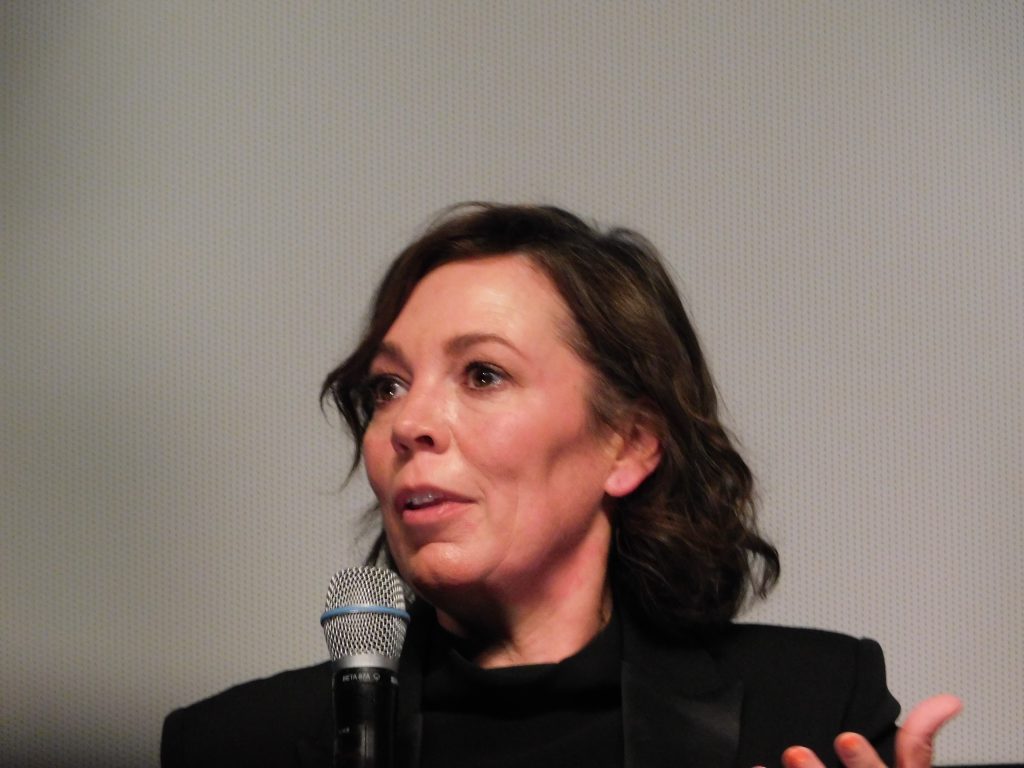
Q: I want to hear from everyone, the rest of the actors. What was it like to be directed by Maggie, an actor with a beautiful career who speaks the language of actors fluently, obviously. So let’s start with Dagmara.
DD: It was a magical dream. We filmed in a pandemic before vaccines on a tiny island in Greece. Just us, really, no family. Maggie and Peter had their wonderful girls, but the rest of us just came. And it was like a moment suspended in time, where you look up and there is Olivia Coleman serving you a mai tai! And Maggie coming up to you and saying, [whispers] “You’re gorgeous, you’re beautiful.” and whispering in your ear, and giving you the freedom and the confidence to tell her story, our story, authentically.
I saw the movie for the first time yesterday and I walked away just blown away. Because [of] the experience of it and being guided by Maggie, who is so inspiring because she leads with such confidence and gentleness. It’s a combination I think only a woman can have on a set where she is the boss. But she didn’t control you. It really was just the best thing ever. What else could I say?
Q: Paul Mescal?
PM: Yeah, I suppose a film like this is testament to the fact that it doesn’t have to be torture, the process doesn’t have to be torture to make good films. Good films can be made by fundamentally good people, and I think that’s true of this film. And also it’s true the kind of atmosphere that is led on set by Maggie and Olivia at the front of the film, leading us through it. I can speak for a lot of us that when they set the tone like that, it’s very easy to — there’s a demand to be at that level or try and get to that height, and step into scenes and engage with the material in a kind of safe but challenging way. So I’m incredibly proud of it and proud to have worked with these amazing people.
Q: Peter? How did you get involved?
PS: It wasn’t easy. I had an amazing experience. I was, like you guys said, on this Greek island, taking care of our children while my wife was making this movie. I would hang out with my children in the morning and they would start school at three in the afternoon. Because of the time difference, they would do school until around ten o’clock at night. I’d take them to the beach in the morning and hang out with them, and I had a very deep, awesome experience with my children during the making of this movie.
The acting was incredibly nerve-wracking for me on some level because I really didn’t want to suck. I thought it would be incredibly embarrassing and humiliating to be really bad in my wife’s movie. Also, I don’t really play roles like this that often, where I’m sortof the object of desire, some sort of amazing guy that every woman would want to be with. Of course Maggie thought I was right for the role, but I couldn’t see myself doing it and I was like “When do I kill someone?”
I remember one of the things that I worked on for a while — and you would never know it, really, watching the movie — is, I give a lecture in the movie. In the script it’s just like a couple of lines. Maggie was like “I really want you to have a whole lecture that you give.” I’m really not an academic. I was like the worst student you could ever possibly imagine. I actually held the record at my high school for least number of days attended in my senior year. I went to school 71 days my senior year, and I still graduated somehow. So I am not an academic.
However, I got really into the idea of this lecture. A friend of Maggie’s helped: Dominique Townsend, who’s a professor at Bard. I watched a number of lectures of people that I admired or knew other people admired. I read a ton, I really worked on it, and when I finally went to go give this lecture, I was so nervous.
I mean, this is nerve-wracking for me as an actor. For me, facing a group of people and talking is not really what it feels like I do for a living. I’m used to being on a stage and facing like, Ed, and we’re having a conversation. When I face this way, my heart beat goes up quite a bit.
I remember I did a take, and I was just happy to have made it through it. I’d said everything, it seemed like it was pretty good, to me. But Maggie came up and she was like “That’s really great. Just take your elbow off the lectern.” I was like, “Take my elbow off the lectern?” It was like the life raft! So I dared to, and my own wife really challenged me.
And as I said, you wouldn’t necessarily know it in the movie because it’s in bits and pieces in there, but that was tough, and I really finally got there. By the end, I really felt like I had been challenged to be better by my own wife and it somehow happened, and I’m proud of those little bits and pieces in there.
Q: Ed?
EH: I thank my wife, Amy [Madigan], for reading the script after I read it. She’s a woman and she read it, and she got it. She said “Eddie, you’ve gotta do this movie.” So I said “Okay.” I wanted to be sure. I read it again and finally understood where Ferrante, Maggie and where my wife — how they were perceiving it and where it was coming from.
I have a daughter and I remember when she was little, and taking care of her a lot, and getting at times really frustrated and confused, and you know, like “What do I do with her?” She’s annoying me or she’s demanding things. So some of the frustrations or some of the difficulties of being a mother, that kind of thing.
But anyway, I had the opportunity. I was told I was going to be working with Olivia Coleman and I was excited about that, because I like working with the best people. And she’s certainly that. And Maggie was great to work with because she made it a very — I think for all of us, she made it a very personal, intimate experience in terms of relationship between actor and director. She’s not someone who gives you a note in front of the crew. She comes up and very [softly] “Ed, why don’t you try doing this?” or “What about if he’s . . . ” dadadadada. And I go “Okay Maggie, we can do it.” And it was just fun, it was great.
You know, I’ve got to say, I’ve been doing this for a while, making films and things. And I don’t feel that as an actor in front of a camera, I don’t think I’ve ever felt as relaxed as I did working with Maggie on this. So that was kindof cool.
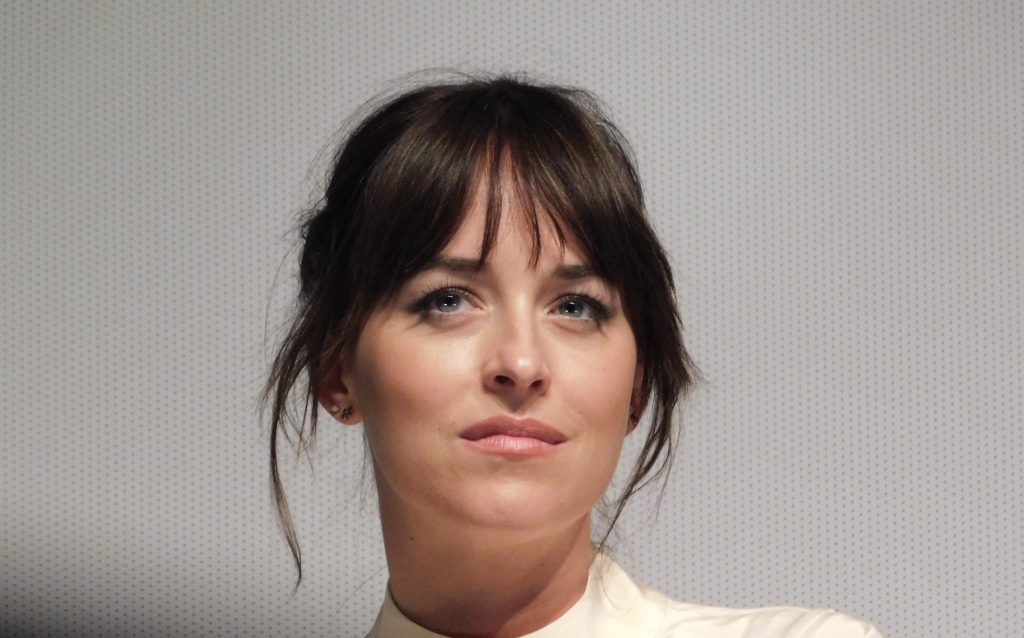
Q: Dakota?
DJ: I feel like Maggie having experienced so many different kinds of films herself, has waded through all the bullshit of making movies and goes directly to what’s pure and what is honest and what is safe.
I think for me, Nina is a really different woman, and is so — not helpless, but just wants something, wants something from anybody. It’s just like “Help me!” I think that Maggie really gave me the space to be that vulnerable all the time, and not feel like I wasn’t going to be taken care of in that moment and in the edit. And that was very important to me.
You know, a lot of times, you’re on set and you’re doing something that’s really scary or really emotional or really provocative, and you’re giving so much of yourself. And you’re like, “There’s something in me that knows that this is not going to be taken care of, but I’m doing my job, and I have to do my job.”
But in this I didn’t feel like I was “doing a job”, I felt like I was doing my art. I felt like I was expressing my true artist self, and so were all of these people. It was like a family, and it was, like, everyone had each other’s back. And if one of us had a hard day, everyone was there. It was like, “No, that was great. Don’t go into your hotel room and cry and regret choosing this as a career.” I’ve done that a lot.
But I think that’s the thing that made it so special with Maggie: no matter what beautiful moment or extremely ugly moment, it was totally safe. And that is perfect.
Q: One of the things I love about the movie is the great chemistry among all the cast members you see onscreen. But also there’s an undercurrent of tension. You almost feel like you’re always on the verge of something dangerous happening.
It’s funny, after the screening yesterday I was browsing Twitter to see the reactions. A good journalist friend of mine said “And people say “Uncut Gems” is stressful. This was more stressful for me to watch.” And I understood what she meant. I think that tension is so palpable, especially between the three mothers, almost like three corners of a triangle: someone with grown children, a new mother, and an expectant mother.
Q : Can you talk about fielding that chemistry and tension between the three of you? And how do you work with your actors, maintaining that?
MG: I was on the jury at Cannes this year, and I saw twenty-four incredible movies. I saw them ten days after I finished my final mix on this movie. And I realized something at Cannes: I was like, “Ohhh, you can do whatever you want.”
But I think in this film, I thought I will be able to do whatever I want, I will be able to express whatever I want, if I hang it on a form that’s known so that people feel “Oh, I know what’s coming. I’ve got this rhythm.” Then I can, like, hundred-and-eighty-degree it. I can do whatever I want, but I have to set up.
I was using the language of a thriller. And even, sometimes, there’s a little horror sprinkled in, and a little French film. But really what you’re talking about, in a way maybe, is the thriller aspect of the story, which I wanted to create that. And then I wanted the whodunit and the terrifying thing to be what’s actually inside of Leda’s mind — and actually inside, probably, many many peoples’ minds. Of course, that’s the most terrifying thing, you know: what lives in our minds.
So I think I wanted to use the language of classic thriller in a way to create that tension.
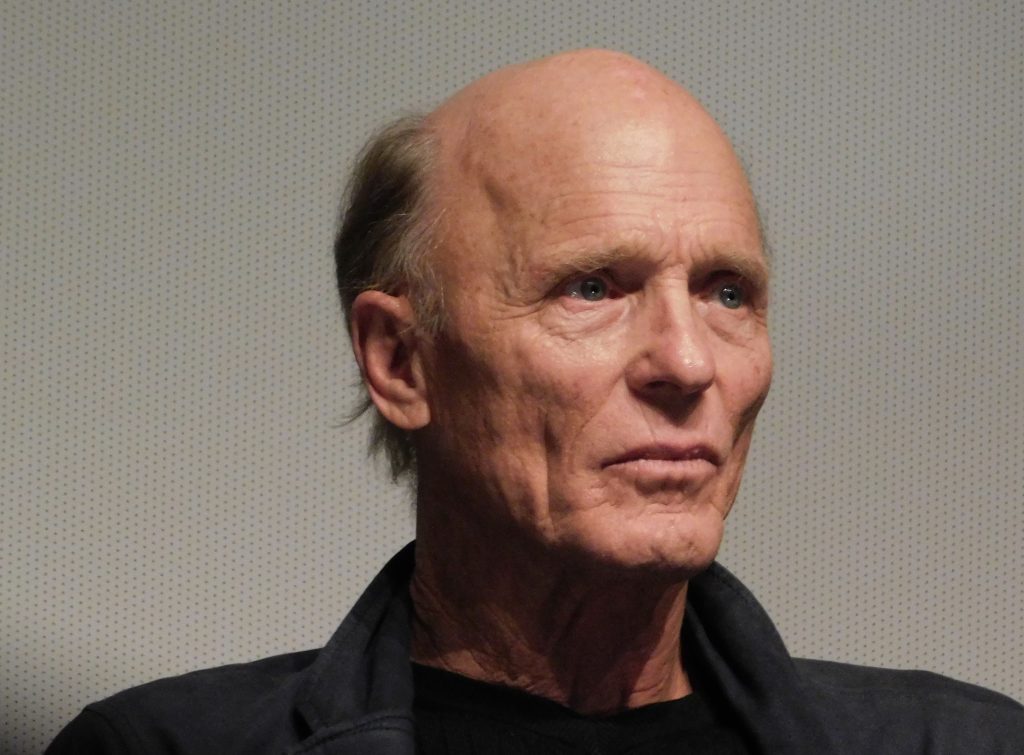
Q: Olivia, Dakota and Dagmara, do you want to add anything? Building up that chemistry and tension among the three of you.
OC: I never want to let Maggie down.
Q: The dynamic has been the three characters, both the harmony and tension they have. Dag, did you create tension?
DD: Did I create tension?
DJ: You know, it’s interesting because I was ready to create tension when I read it out, like “all right.”
DD: She would spin me the other way, and she was like the great note whisperer. She would come in and drop like, twelve, and just say “whatever sinks deepest”, like, “We’ll see what happens.” And so on the page, and in the book, Callie’s character is bold and brash, and she’s the one who wants to get a snack for everyone, but it has to be her snack.
I know moms like that, and sometimes I’m one like that, too. But I remember Maggie saying to me “She wants to be validated. She wants to be loved. She’s wonderful.” I’ve never felt like everything more relaxed or more confident in a movie. And I’m in a bikini with a pregnant fake belly and my jigglies are out, and Maggie made me feel extremely beautiful.
We discussed how not every woman who is loud and opinionated is a fuckin’ bitch. So let’s try it different. And so I think the tension isn’t like, oh three different personalities and they all hate each other. It’s three different women who want to know that they’re good inside and sometimes don’t know how to do that. I think that’s where the tension lies. Right?
OC: I would have said that. That’s exactly what I would have said.
DK: I also feel like Maggie does this thing where it’s like life is tension. Every day for me is tension. And I have moments with women and with men, and people, and everyone that is tension. But now, you go to the movies because it’s escapism, or you’re binge-watching a show because you want to feel less tension. But isn’t the point of art to make you feel things that you need to look at, and then you feel tension in this movie. I feel like women can just look at each other and have millions of different tensions without saying anything.
MG: Yes, and that scene — I love the scene where you’re asking about these three women here. I love that scene between you guys when you just found the little girl. And so in terms of tension, these two women looking at each other. Dag, someone said to me about you, was giving me a note early on about the movie, and they said, “Well, I don’t know. I can’t tell if I’m supposed to love her or if I’m supposed to be afraid of her.” And I’m like “Oh, yeah!”
DK: How many people do actually feel [like that]?
DD: That’s what my kids think about me every day.
DK: Yeah. Also, that scene, you’re like — is Nina going to cry, is she going to apologize? Is she embarrassed? Are they going to have sex? What’s going to happen?
MG: Yes, yes. There’s so much tension or vibration between you guys. I don’t think you could articulate what it is, what kind. I love the scene because it’s like five hundred thousand different things going on between you guys, and beyond my wildest dreams.
DD: Yeah but that’s you, because you didn’t tell us to play it one way. You would do your whisper thing and then it just —
OC: We each had twenty whispers.
DK: Yeah and I’m like “Well, what’d she say to you?”

Q: I love the visual language you created for this movie, and also the cinematographer you worked with, Hélène Louvart.
You stay very close to your characters. This is a very intimate kind of movie. So can you talk about crafting that and your preference to stay close to the character?
MG: Well, I think it’s so interesting that so many people have said that to me. In fact, early on in editing, I got a note saying “We’ve got to expand a little bit. Can we see where we are?” Because I was watching the beginning of the movie and going, “big wide shot, oh, another big wide shot; another big wide shot.” I think it doesn’t get digested that way. I think because the movie is so subjective, inside of Leda’s mind, actually in terms of the cinematic language, there’s a lot of moving back and being wide. But it doesn’t feel like it, for some reason.
Hélène — I am so grateful to that woman. She’s got five kids. She really taught me how to prep. I knew that I needed to prep, in fact I met a DP who I was a massive fan of. He sortof pretended for a minute that he wanted to shoot the movie, and we had lunch a few times. He [said] “I don’t prep. I don’t do any prep.” But I was like, Wow. I don’t think I can do that.
Hélène was, “Of course you need to prep.” We spent hours on Zoom in the pandemic thinking through the scenes. Then we scouted together and then we really shot listed together. But we had shot lists, I mean really organized. And I never opened my binder with my shot list in it one time, the whole time we were shooting.
I don’t know how much we did that we had imagined. Certainly, coming from being an actress, I want my actors to be free, and if they came in with their own sense of what they were doing — and they always did — you can’t really shot-list. But the point is, we really knew what the scenes were about. Together we knew what we were after. So then it was like jazz, because we were free enough to run with it.
Like have you guys done scenes where we’re at a dinner table? All of us are at a dinner table, and somebody’s shooting it and they’re like “I need two shots on you, and you, and you, and you.” And then they need your P.O.V. of everybody, and my P.O.V. of everybody. And you want to shoot yourself by the end of the day.
But if you know that the scene is really about Paul, and how he feels about Peter, then I don’t have to come on that day.
[laughter]
You’d shoot it in half a day, which is what we had to do anyway. because we only had twenty-eight days. But she helped me to really understand.
I learned to love the lenses. I didn’t know that language. Now I knew some languages in filmmaking, and I was like “Get that fifty off.” I really learned. I told Hélène that at the end, and she said “Yes, you did, you learned quite quickly.” And I was terrible. She was totally like “Yeah. So people learn about London, whatever. ” To me it was incredibly expansive. She really taught me so much.
Q: I know Jessie Buckley isn’t here, but I did want to talk about her a little bit.
You, Olivia, and Jessie basically built the same character in two different points of her life. So I’m wondering what goes into that. Did you have any conversations about how to tackle this character in two different life stages?
OC: We knew each other beforehand, and I am obsessed with Jessie, I just think she’s incredible. We spoke and said “What action shall we do?” And that was what we decided, and then we didn’t speak again.
It was lovely, though. I knew at this moment I might have realized that people are not sure of where they came from. It’s all in the script, and clearly Jessie and I didn’t talk to each other and we found it in the script. And it is all there, and we both ended up with something.
Even though we’re clearly two different people, we understood it so beautifully between us. We sortof came up with the same thing In a way, albeit different. But a woman in her twenties is not the same woman in her thirties or her forties. No, we all change, so it’s okay that we’re different. And Maggie said “It’s okay. You don’t have to meet and have a great big thing about it.” And she’s right.
But I think it’s because the script is so good, we just knew our road map was clear. So we didn’t go massively awry. For some reason, that was a massive moment for me, just that second. So we’re good, it’s good. We basically said we’re from Shipley in Leeds, but we’ve been educated so the edge is taken off it. See you there.
Q: I think we have to wrap it up. Thank you so much.

